Introduction:
Welcome to the world of referral marketing, a powerful strategy that can revolutionize your business and boost your conversion rates. In the fast-paced digital marketing landscape, finding effective tactics can be challenging. However, referral marketing offers a unique approach by harnessing the influence of word-of-mouth recommendations.
Referral marketing works by leveraging the trust and impact of satisfied customers. These customers become brand advocates who spread the word about your products or services, bringing in high-quality leads and driving conversions. It’s a win-win situation for both your business and your customers.
In this comprehensive guide, we will explore the potential of referral marketing and provide practical insights for implementing a successful referral program. We’ll discuss the importance of referral marketing, share real-life case studies, and provide tips and best practices to help you create an effective program.
Get ready to unlock the power of referrals and take your business to new heights. Let’s dive in and discover how referral marketing can transform your conversions and drive sustainable growth.
Learn how referral marketing can drive significant business growth and conversions. Explore our comprehensive guide and unlock the potential of customer advocacy.
What is referral marketing?
Referral marketing is a marketing strategy that harnesses the power of word-of-mouth recommendations to promote a business, product, or service. It involves encouraging and incentivizing existing customers to refer their friends, family, or colleagues to the business. Referral marketing relies on the trust and influence established through personal recommendations to drive new leads and customers. By leveraging the satisfied customer base, businesses can tap into a network of brand advocates who actively promote the business, leading to increased conversions and sustainable growth. Referral marketing often involves the use of referral programs, where customers are rewarded for successful referrals, creating a mutually beneficial relationship between the business and its customers.
What is the conversion rate for referrals?
The conversion rate for referrals refers to the percentage of referred leads or customers who take the desired action, such as making a purchase, signing up for a service, or completing a specific goal. The exact conversion rate can vary depending on various factors, including the industry, target audience, and the effectiveness of the referral program. Generally, referral marketing tends to have higher conversion rates compared to other marketing channels due to the trust and credibility established through personal recommendations.
How referral marketing can be used to increase conversion rates?
Referral marketing can be a highly effective strategy for increasing conversion rates. By leveraging the power of word-of-mouth recommendations, businesses can tap into the trust and influence of their satisfied customers to drive more conversions. Here are a few key ways referral marketing can help boost conversion rates:
- Establishing Trust: Referrals build trust and credibility as potential customers are more likely to trust recommendations from people they know. By encouraging referrals, businesses can leverage this trust to increase conversion rates.
- Targeted Audience: Referred leads are often pre-qualified and aligned with the target audience, increasing the likelihood of conversion. Referral marketing enables businesses to attract highly targeted leads who have a genuine interest in the products or services being referred.
- Incentivizing Action: By offering incentives or rewards to both referrers and referred customers, businesses can motivate them to take action and convert at a higher rate. Incentives create a win-win situation where referrers feel rewarded for their efforts, and referred customers are incentivized to make a purchase or take the desired action.
- Amplifying Reach: Referral marketing extends the reach of a business by leveraging the networks of existing customers. When customers refer others, they introduce the brand to a wider audience, increasing brand exposure and potential conversions.
The Benefits of Referral Marketing
When it comes to driving conversions, nothing beats the power of a personal recommendation. In this section, we’ll explore why referral marketing is so crucial for your business. We’ll delve into the psychology behind referrals and explain how they can establish trust, build brand credibility, and ultimately lead to higher conversion rates. Get ready to discover the impact of referral marketing and why it should be a key component of your marketing strategy.
- Increased Conversion Rates:
Referral marketing has the potential to generate leads with higher conversion rates compared to traditional marketing channels. When a product or service is recommended by a friend, family member, or colleague, the trust and credibility associated with the referral significantly influence the purchasing decision. According to Nielsen studies, referred customers are 4 times more likely to make a purchase and have a 16% higher lifetime value. By tapping into the power of social proof, referral marketing can help you convert more prospects into loyal customers. - Cost-Effectiveness:
One of the remarkable advantages of referral marketing is its cost-effectiveness. Traditional advertising and marketing campaigns often come with hefty price tags, while referral marketing leverages existing customers to promote your brand. By incentivizing referrals, you can turn your customers into enthusiastic brand advocates, spreading the word about your products or services without breaking the bank. With the right referral program in place, you can achieve substantial growth while optimizing your marketing budget. - Enhanced Customer Loyalty:
Referral marketing goes beyond acquiring new customers; it also plays a pivotal role in strengthening customer loyalty. When customers refer your business to their network, they are not only vouching for your brand but also reinforcing their own positive experience. Referral programs provide a platform for your customers to engage with your brand on a deeper level, fostering a sense of loyalty and community. By prioritizing referral marketing, you can build long-lasting relationships with your customers, leading to higher customer retention rates and increased customer lifetime value. - Quality Leads and Higher Lifetime Value:
Referred customers tend to be highly qualified leads with a higher potential for long-term value. Since they are introduced to your business through a trusted source, they often have a better understanding of your products or services and a higher propensity to become repeat customers. Referral marketing enables you to attract customers who align with your target audience, resulting in higher customer lifetime value. - Expanded Brand Reach and Awareness:
Referral marketing has the power to amplify your brand’s reach organically. Each satisfied customer who becomes a brand advocate extends your reach by recommending your business to their network. This word-of-mouth promotion can lead to a viral effect, exposing your brand to a wider audience and increasing brand awareness without significant additional marketing costs. - Authentic User-Generated Content:
Referral marketing generates valuable user-generated content (UGC). When customers share their positive experiences with your brand, they often provide testimonials, reviews, and social media mentions. This UGC serves as social proof, influencing potential customers’ purchasing decisions and boosting your brand’s reputation. - Long-Term Growth and Sustainable Business Success:
By leveraging the power of referrals, you can fuel long-term growth and establish a sustainable business model. Referral marketing fosters a cycle of continuous customer acquisition, as each new customer has the potential to refer more customers, creating a self-sustaining mechanism for business expansion.
Implementing a Successful Referral Program
Implementing a successful referral program can be a game-changer for businesses looking to boost their conversions and drive sustainable growth. By harnessing the power of word-of-mouth recommendations, businesses can tap into the influence of their satisfied customers to generate a steady stream of high-quality leads.
However, a successful referral program requires careful planning and execution. From defining program objectives to designing a seamless referral process, and from promoting the program to tracking its performance, each step plays a crucial role in maximizing the program’s effectiveness. In this section, we will explore the key elements and strategies involved in implementing a successful referral program that can propel your business forward and unlock the full potential of customer advocacy.
- Setting Clear Objectives:
To create an effective referral program, it is essential to define clear objectives aligned with your overall marketing goals. Are you looking to increase conversion rates by a certain percentage? Do you want to target specific customer segments? By clearly identifying your objectives, you can design a referral program that aligns with your business’s unique needs. - Identifying the Right Incentives:
Incentives play a crucial role in motivating customers to refer your brand to others. Consider both monetary and non-monetary incentives, such as discounts, exclusive access to products or services, or even gamification elements. The key is to offer rewards that are valuable and relevant to your target audience. - Choosing the Referral Channel:
Selecting the right referral channel is crucial for the success of your program. Leverage multiple channels, including email, social media, website integrations, and even offline methods such as in-store referrals or direct mail. Analyze your customer demographics and preferences to determine the channels that will yield the highest engagement and conversion rates. - Creating Compelling Referral Messages:
Crafting persuasive and shareable referral messages is essential to encourage your customers to spread the word about your brand. The message should be clear, concise, and highlight the benefits of your product or service. Personalization can also be highly effective in capturing the attention of both the referrer and the referred customer. Tailor your referral messages to resonate with your target audience, addressing their pain points and showcasing how your offering can provide a solution. Experiment with different messaging variations and track their performance to optimize your results. - Tracking and Measuring Referral Performance:
To gauge the effectiveness of your referral program, it is crucial to implement robust tracking and measurement systems. Set up analytics tools to track referral activities, including clicks, conversions, and revenue generated. Monitor key metrics such as referral conversion rate, referral traffic, and customer acquisition cost. Regularly analyze the data to identify trends, optimize your program, and maximize your conversion rates.
Referral Program Examples
In this section, we’ll showcase real-life case studies of successful referral programs. We’ll examine how leading brands in various industries have leveraged the power of referrals to drive conversions and achieve remarkable results. From e-commerce giants to innovative startups, these examples will inspire you and provide insights into the different approaches and strategies that have worked for others.
Case Study 1: Dropbox’s Referral Program
Dropbox, a leading cloud storage provider, implemented a highly successful referral program that propelled their growth. Their referral program offered existing users additional storage space in exchange for referring new users to the platform.
The program was simple yet effective. Existing users were provided with a unique referral link that they could share with their friends and colleagues. When someone signed up for Dropbox using the referral link, both the referrer and the referred friend received extra storage space, incentivizing participation from both sides.
The results were astounding. Dropbox’s referral program played a significant role in their rapid user acquisition and conversion rate growth. In just 15 months, Dropbox’s user base increased from 100,000 to 4 million users. Their conversion rates skyrocketed due to the trust and social proof associated with referrals, leading to long-term customer loyalty.
Key Takeaways:
- Offer incentives that are valuable to both the referrer and the referred customer.
- Keep the referral process simple and easy to understand.
- Leverage the power of social proof to boost conversion rates.
Case Study 2: Airbnb’s Ambassador Program
Airbnb, the renowned online marketplace for vacation rentals, implemented an ambassador program that turned their loyal customers into brand advocates. The program aimed to attract new hosts to the platform by utilizing the influence of their existing hosts.
Under the ambassador program, Airbnb provided exclusive benefits and rewards to hosts who referred new hosts to the platform. These rewards included cash bonuses, travel credits, and priority customer support. By incentivizing their existing hosts to refer new hosts, Airbnb successfully increased the supply of available accommodations, ultimately driving higher conversion rates for bookings.
The ambassador program was an immense success for Airbnb. Not only did it result in a significant increase in hosts and listings, but it also enhanced customer loyalty among their existing hosts. Hosts felt valued and appreciated, leading to a stronger relationship between Airbnb and their hosts.
Key Takeaways:
- Identify opportunities to turn your existing customers into brand advocates.
- Provide exclusive benefits and rewards for successful referrals.
- Foster a sense of community and loyalty among your customers through referral programs.
These real-time examples showcase the power of referral marketing in increasing conversion rates and driving sustainable growth. By learning from successful companies like Dropbox and Airbnb, you can implement similar strategies and adapt them to your business model, resulting in remarkable conversion rate improvements and long-term success.
Best Practices for Referral Marketing
To create a successful referral program, you need to follow best practices that have been proven to drive results. In this section, we’ll share a comprehensive set of guidelines and strategies that will help you design, launch, and manage an effective referral program. From incentivizing your customers to crafting compelling referral messages, we’ll cover all the essential elements that contribute to a high-performing referral program.
- Making Referral Programs Easy to Use:
Simplicity is key when it comes to referral programs. Ensure that the referral process is user-friendly and frictionless. Provide clear instructions and intuitive interfaces for customers to refer their friends effortlessly. Optimize your referral program for mobile devices, as mobile usage continues to rise. - Leveraging Social Media and Influencers:
Harness the power of social media platforms to amplify your referral program. Encourage customers to share their referral links on social media and provide easy social sharing buttons. Collaborate with influencers or brand advocates who align with your target audience to extend your reach and credibility. - Personalizing the Referral Experience:
Tailor the referral experience to make it personal and memorable. Use customer data to personalize referral messages, addressing customers by name and acknowledging their loyalty. Consider offering personalized incentives based on individual preferences to make the referral program feel exclusive and tailored to each customer. - Monitoring and Optimizing Referral Programs:
Continuously monitor the performance of your referral program and conduct A/B testing to optimize its elements. Test different incentives, messaging, and referral channels to identify what resonates best with your audience. Use the data and insights gathered to refine your program and drive higher conversion rates.
Curious about how well your referral program is performing? Get a free assessment today and uncover opportunities for improvement and increased conversions.
Shopify Apps for Running a Referral Program
When it comes to running a referral program on your Shopify store, there are several excellent apps available that can streamline the process and maximize your results. Here are some of the best Shopify apps specifically designed for running referral programs:
Refersion
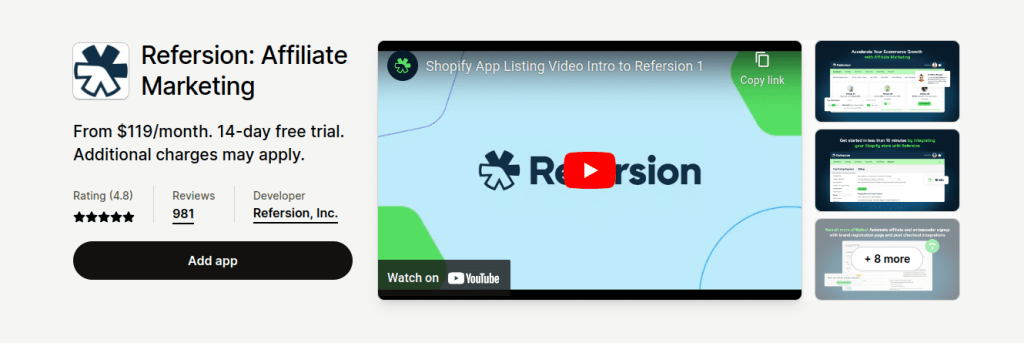
Refersion is a comprehensive referral marketing platform that seamlessly integrates with Shopify. It provides robust features for creating, managing, and tracking your referral program. With Refersion, you can easily set up referral links, track conversions, and reward customers for successful referrals. The app offers detailed analytics to monitor the performance of your referral program and optimize it for better results.
Smile: Rewards & Loyalty
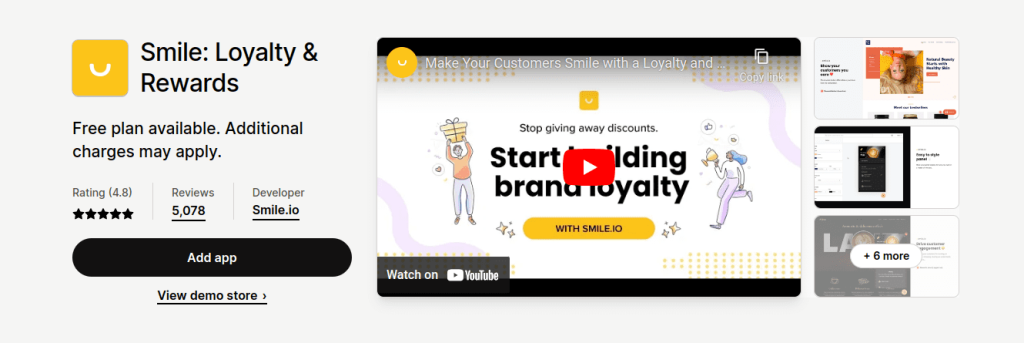
Smile is a popular Shopify app that not only enables you to run a referral program but also offers a full-fledged loyalty program. With Smile, you can create a referral program that incentivizes customers to refer their friends and family. Additionally, you can implement a loyalty program that rewards customers for repeat purchases and other desired actions. The app provides customization options to align the referral program with your brand’s aesthetics and offers detailed analytics to track the effectiveness of your efforts.
ReferralCandy
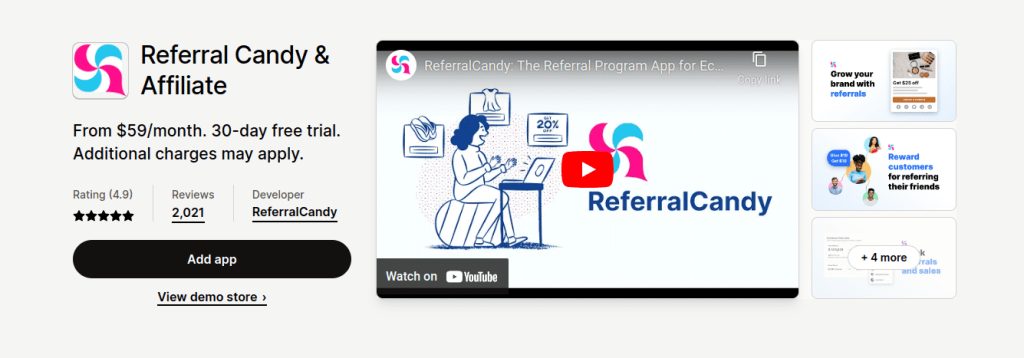
ReferralCandy is a user-friendly app that makes it easy to set up and manage your referral program on Shopify. It automates the referral process by sending referral invitations and tracking referrals and conversions. ReferralCandy also provides flexibility in designing referral rewards and offers performance analytics to help you measure the success of your program. The app integrates with popular email marketing platforms, making it convenient to engage with customers through referral campaigns.
Yotpo
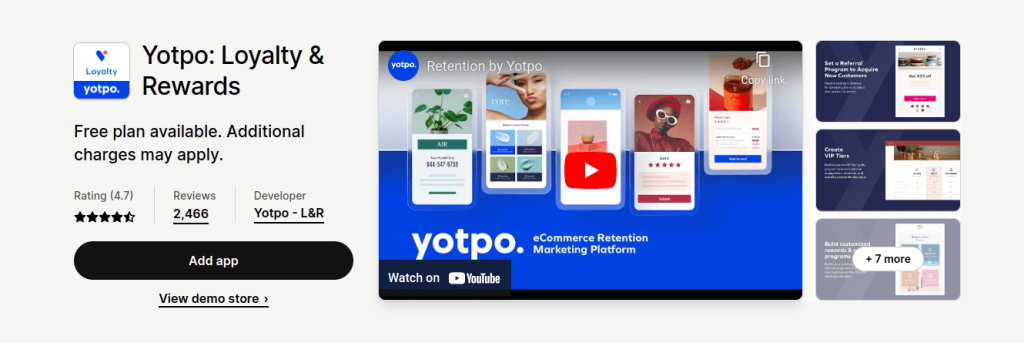
Yotpo is a comprehensive customer marketing platform that includes a referral program feature. Alongside collecting and displaying customer reviews, Yotpo enables you to create and manage a referral program on your Shopify store. With Yotpo, you can encourage customers to refer their contacts through various channels, including email and social media. The app provides customization options, real-time analytics, and performance tracking to optimize your referral program.
Shopjar: Referral & Affiliates
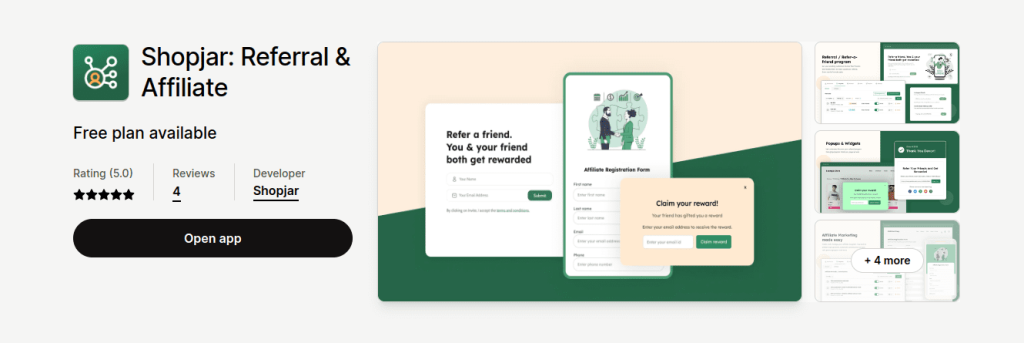
Shopjar is a scalable referral marketing platform that seamlessly integrates with Shopify. It offers a range of features to create and manage a successful referral program. Shopjar provides customizable referral campaigns, fraud detection mechanisms, and analytics to measure the impact of your program. With its automation capabilities, Shopjar simplifies the process of tracking referrals and rewarding customers, allowing you to focus on nurturing customer relationships.
TapMango
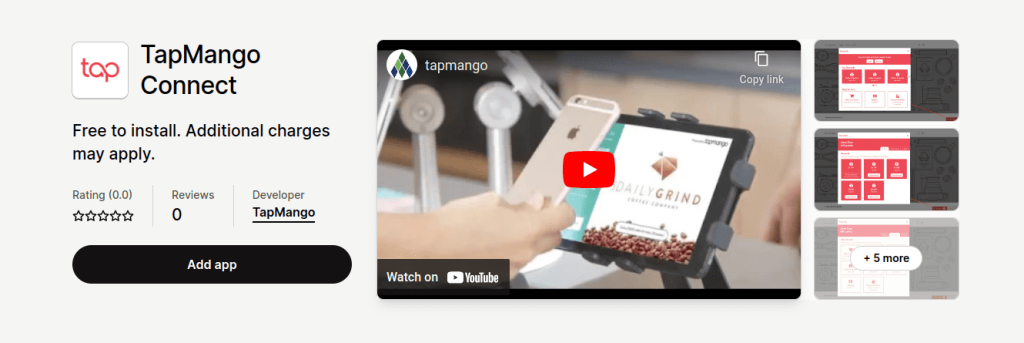
TapMango is a versatile app that combines customer loyalty and referral program functionalities. With TapMango, you can create a referral program that incentivizes customers to refer new customers to your Shopify store. Additionally, TapMango offers a suite of tools for managing customer loyalty, including rewards, promotions, and targeted marketing campaigns. The app provides detailed analytics to track the performance of your referral program and loyalty initiatives.
When selecting a Shopify app for your referral program, consider factors such as ease of use, integration capabilities, customization options, and customer support. Evaluate each app based on your specific requirements and goals to choose the one that aligns best with your business needs.
Tips to Get More Conversions from Your Referral Program
Boosting conversions from your referral program requires a proactive approach and strategic implementation. In this section, we’ll provide you with valuable tips and actionable steps to optimize your referral program for maximum conversions. From designing attractive incentives to promoting your program effectively, we’ll guide you through the process of turning your customers into brand advocates and driving more conversions.
- Clearly Communicate the Value:
Ensure that both referrers and referred customers understand the value they will receive from participating in your referral program. Clearly communicate the benefits and incentives, such as discounts, exclusive access, or rewards. Highlight how referring friends can enhance their overall experience with your brand, making it a win-win situation. - Offer Irresistible Incentives:
To motivate customers to refer others, provide incentives that are irresistible. Consider offering exclusive discounts, freebies, or access to premium features. The incentives should be valuable enough to encourage customers to take action and refer their contacts. Experiment with different incentive structures and monitor their impact to find the optimal balance. - Simplify the Referral Process:
Make it as easy as possible for customers to refer their friends. Implement a seamless referral process with clear instructions and intuitive user interfaces. Provide customers with a unique referral link or code that they can easily share through multiple channels, such as email, social media, or messaging apps. The easier it is for customers to refer others, the more likely they are to participate. - Leverage Existing Customer Touchpoints:
Identify the various touchpoints where you can promote your referral program to existing customers. This could include order confirmation emails, thank you pages, or post-purchase follow-ups. Incorporate compelling calls-to-action that encourage customers to refer their friends at every opportunity. By leveraging existing customer touchpoints, you can increase program visibility and drive more conversions. - Utilize Social Proof:
Leverage the power of social proof to enhance the credibility and effectiveness of your referral program. Showcase testimonials or success stories from customers who have benefited from the program. Incorporate social proof elements such as star ratings, reviews, or user-generated content that highlight the positive experiences of referrers and referred customers. This can instill trust and confidence in potential participants, leading to higher conversion rates. - Create a Sense of Urgency:
Introduce a sense of urgency into your referral program by incorporating limited-time offers or time-bound rewards. Communicate that the opportunity to receive the referral incentives is time-sensitive, creating a fear of missing out (FOMO) among customers. This can encourage them to act quickly and refer their contacts, driving immediate conversions. - Actively Promote Your Referral Program:
Don’t assume that customers will automatically know about your referral program. Actively promote it through various marketing channels, such as your website, social media profiles, email newsletters, and paid advertising campaigns. Highlight the benefits, incentives, and success stories to entice customers to participate. Consistent and strategic promotion will increase awareness and participation, leading to higher conversion rates. - Monitor and Optimize:
Regularly monitor the performance of your referral program and track key metrics such as referral conversion rates, customer acquisition cost, and the lifetime value of referred customers. Analyze the data to identify trends, strengths, and areas for improvement. Experiment with different messaging, incentives, and referral channels to optimize the program’s performance and drive higher conversions.
By implementing these tips, you can maximize the effectiveness of your referral program and increase conversion rates. Remember, successful referral marketing requires continuous monitoring, testing, and optimization. Stay attentive to customer feedback, adapt to market trends, and be open to refining your program to achieve optimal results.
Curious about how well your referral program is performing? Get a free assessment today and uncover opportunities for improvement and increased conversions.
Conclusion
Referral marketing is a powerful strategy that can significantly boost your conversion rates and drive sustainable business growth. By leveraging the influence of satisfied customers, implementing a well-designed referral program, and optimizing its elements, you can tap into the potential of word-of-mouth marketing and amplify your brand’s reach. Start implementing referral marketing today and witness the transformative impact it can have on your conversion rates, customer loyalty, and overall business success.
Remember, successful referral marketing requires careful planning, execution, and continuous optimization. Stay attentive to customer preferences, industry trends, and emerging technologies to stay ahead in the competitive landscape. Embrace the power of referrals and unlock a world of conversion rate growth.
To encourage customer participation, clearly communicate the benefits of your referral program. Offer valuable incentives, make the referral process easy, and actively promote the program through various touchpoints. Additionally, leverage social proof and create a sense of urgency to motivate customers to refer their friends.
The most effective incentives vary depending on your target audience and industry. Common incentives include discounts, freebies, store credits, exclusive access, or cash rewards. Experiment with different types of incentives and monitor their impact to find the ones that resonate most with your customers.
Use the analytics and reporting features provided by your referral program app to track key metrics such as referral conversion rates, customer acquisition cost, and customer lifetime value. Monitor these metrics regularly to evaluate the program’s performance and identify areas for improvement.
Yes, offering incentives to both parties creates a win-win situation and encourages participation. By rewarding both the referrer and the referred customer, you increase the motivation for customers to refer others and enhance the overall customer experience.
Promote your referral program through various marketing channels, including your website, social media platforms, email newsletters, and paid advertising campaigns. Clearly communicate the program’s benefits, incentives, and success stories to entice customers to participate. Consistent and strategic promotion is key to increasing awareness and driving participation.
Yes, running multiple referral campaigns can be beneficial, especially if you have different customer segments or target markets. Tailor the campaigns to each segment’s preferences and needs, offering specific incentives and messaging that resonate with them.
Regular evaluation and optimization are crucial for the success of your referral program. Monitor the program’s performance on an ongoing basis, and make adjustments as needed. Analyze the data, gather customer feedback, and stay updated with market trends to continually refine and optimize your program for better conversion rates.
To encourage active promotion, provide customers with resources such as pre-written social media posts or email templates that they can easily share with their network. Additionally, consider offering additional incentives or bonus rewards for customers who go above and beyond in promoting your referral program.
Absolutely! In fact, integrating your referral program with other marketing strategies can amplify its impact. Consider combining it with email marketing, social media campaigns, influencer partnerships, or content marketing to reach a wider audience and increase your chances of conversions.
To prevent fraud or abuse, implement measures such as IP tracking, email verification, or limiting the number of referrals per customer. Regularly review and monitor the program for any suspicious activity. Additionally, clearly communicate the terms and conditions of the referral program to ensure transparency.
Both options can be effective, depending on your business model and target audience. A one-time incentive can create a sense of immediate gratification, while ongoing rewards can encourage continued referrals. Consider your customer preferences, budget, and long-term goals to determine the most suitable approach for your referral program.
Offer exclusive discounts or promotions to referred customers as an added incentive to make a purchase. Ensure that the incentives are compelling and clearly communicated to increase the likelihood of conversion. Consider providing a personalized welcome message or special offer to make referred customers feel valued and motivated to take action.
